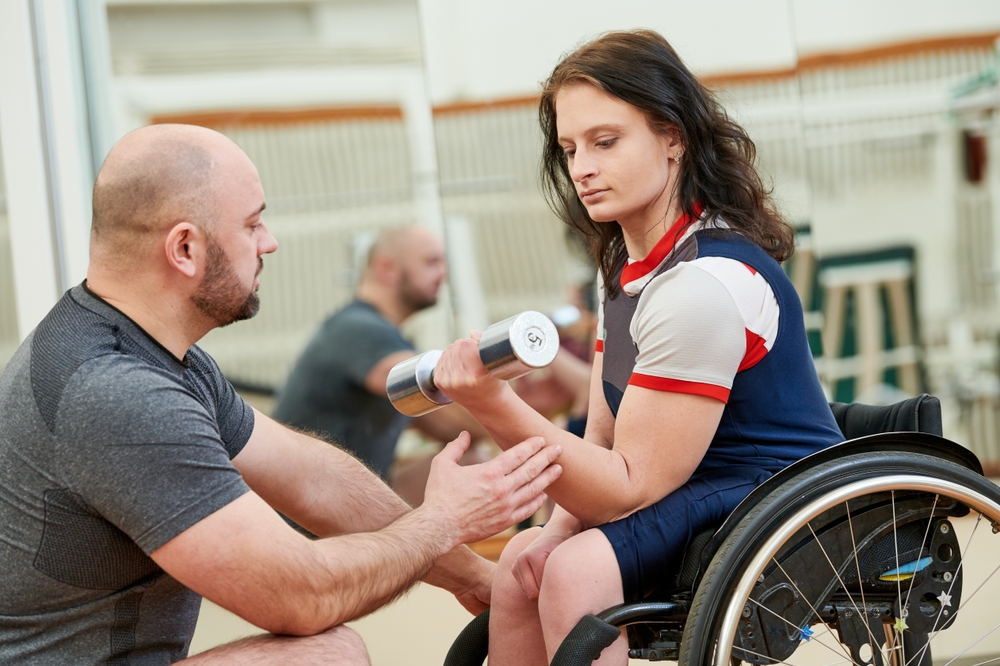Make an Appointment
Living with a disability often presents unique challenges that affect mobility, strength, and overall independence. Physiotherapy plays a transformative role in addressing these challenges by tailoring evidence-based interventions to each individual's needs. Whether you are managing a condition from early childhood or as a result of age or injury, regular physiotherapy sessions can significantly improve your quality of life. This blog explores how physiotherapy empowers individuals with a range of common disabilities, helping them build strength, reduce pain, and reclaim their independence.

Understanding the Role of Physiotherapy for Individuals Living with Disability
Physiotherapy is a comprehensive approach aimed at restoring and improving physical function. It involves personalised exercise programs, manual therapy, and education on self-management strategies—all designed to help you overcome limitations and enhance everyday movement. The benefits of physiotherapy extend beyond just physical improvements; they include reduced pain, enhanced confidence, and a greater ability to perform daily tasks independently.
Key Benefits of Physiotherapy
Enhanced Mobility and Independence:
Tailored exercise programs rebuild strength and balance, making everyday tasks easier and reducing the need for assistance.
Effective Pain Management:
Manual therapy and specialised exercises help alleviate chronic pain, allowing for more comfortable movement.
Improved Strength and Endurance:
Progressive resistance and functional training boost muscle strength and overall stamina.
Prevention of Further Injury:
Addressing muscle imbalances and improving joint stability reduces the risk of future injuries.
Boosted Confidence:
As physical function improves, increased confidence leads to more active participation in social and community activities.

How Physiotherapy Helps with Common Disabilities
Physiotherapy offers tailored interventions that address the specific challenges associated with various disabilities. Here’s how it benefits some of the most common conditions:
1. Autism Spectrum Disorder (ASD)
Challenges:
Individuals with ASD may experience motor coordination difficulties, sensory processing issues, and balance impairments.
Physiotherapy Benefits:
Tailored exercises improve motor planning, coordination, and balance, enabling better participation in daily routines and social activities.
Example Intervention:
Structured movement programs that combine balance exercises with play-based activities to foster engagement and enhance functional skills.
2. Intellectual Disability
Challenges:
People with intellectual disabilities often face muscle weakness, coordination problems, and reduced endurance, affecting everyday tasks.
Physiotherapy Benefits:
Customised strength and mobility exercises build functional independence, enabling safer and more confident performance of daily activities.
Example Intervention:
Progressive resistance training and balance drills integrated into practical activities to improve overall function.
3. Cerebral Palsy
Challenges:
Cerebral palsy can result in muscle spasticity, poor coordination, and limited mobility.
Physiotherapy Benefits:
Targeted exercise programs improve muscle strength, flexibility, and motor control, reducing spasticity and enhancing mobility.
Example Intervention:
A combination of stretching, strength training, and gait training designed to improve functional mobility and support independence.
4. Acquired Brain Injury (Including Stroke)
Challenges:
Acquired brain injuries, such as those from stroke or trauma, can impair movement, balance, and cognitive function.
Physiotherapy Benefits:
Individualised rehabilitation programs focus on restoring movement, enhancing balance, and retraining motor skills to regain independence.
Example Intervention:
Gait training, balance exercises, and task-specific training aimed at relearning essential movement patterns.
5. Multiple Sclerosis
Challenges:
Multiple Sclerosis (MS) can cause muscle weakness, spasticity, fatigue, and balance issues.
Physiotherapy Benefits:
Customised exercise programs help manage fatigue, improve muscle strength, and enhance balance, enabling better overall function and quality of life.
Example Intervention:
A combination of aerobic exercises, resistance training, and stretching to boost physical capacity and reduce symptoms associated with MS.
6. Parkinson's Disease
Challenges:
Parkinson's Disease is characterised by tremors, rigidity, and bradykinesia (slowed movement), which significantly impact mobility and daily functioning.
Physiotherapy Benefits:
Physiotherapy helps manage symptoms by improving gait, balance, and overall movement through specialised exercises that focus on rhythm and coordination.
Example Intervention:
Gait training, balance exercises, and treadmill training designed to improve mobility and reduce the risk of falls.

How Physiotherapists Collaborate with Other Disciplines
While physiotherapy is a cornerstone of rehabilitation, its effectiveness is greatly enhanced when physiotherapists work in collaboration with other allied health professionals. This integrated approach ensures that all aspects of your needs are addressed in a cohesive treatment plan.
Integrated Treatment Plans:
Physiotherapists often collaborate with occupational therapists, speech pathologists, and exercise physiologists to develop unified treatment plans that cover both physical and functional aspects. For example, improvements in mobility from physiotherapy are complemented by occupational therapy’s adaptive strategies for daily living.
Consistent Communication:
Working within a single organisation or closely coordinated team means that all professionals communicate seamlessly. This consistency ensures that every intervention is aligned with your overall rehabilitation goals and progress is monitored collectively.
Holistic Support for Clients and Families:
Integrated care provides comprehensive support that not only benefits you but also offers consistent guidance for your family or carers. This collaborative model reduces the burden on caregivers by providing clear, unified treatment advice and streamlining the rehabilitation process.

Frequently Asked Questions
What is the role of physiotherapy for individuals living with disability?
Physiotherapy helps improve mobility, reduce pain, and enhance overall physical function through customised exercise programs and manual therapy. It is essential for promoting independence and improving daily living skills.
Which disabilities benefit most from physiotherapy?
Common conditions include Autism Spectrum Disorder, Intellectual Disability, Cerebral Palsy, Acquired Brain Injury (including stroke), Multiple Sclerosis, and Parkinson's Disease. Each of these conditions can experience significant improvements in mobility, strength, and functional independence through targeted physiotherapy interventions.
How often should physiotherapy sessions be conducted?
The frequency of sessions depends on individual needs and progress. Many clients benefit from regular sessions—often multiple times per week—with ongoing assessments to adjust the treatment plan as needed.
What are the advantages of mobile physiotherapy?
Mobile physiotherapy delivers expert care directly to your home, reducing travel-related stress and ensuring that treatment is integrated into your daily environment. This service is especially beneficial for individuals with limited mobility or transportation challenges.
How do physiotherapists collaborate with other disciplines?
Physiotherapists work closely with allied health professionals such as occupational therapists, speech pathologists, and exercise physiologists to create integrated treatment plans. This multidisciplinary approach ensures that physical improvements are complemented by functional and adaptive strategies.

Conclusion
Physiotherapy plays a transformative role in empowering individuals living with disability. Through personalised, evidence-based interventions, regular physiotherapy sessions improve mobility, reduce pain, and boost overall independence. Whether addressing challenges associated with Autism Spectrum Disorder, Intellectual Disability, Cerebral Palsy, Acquired Brain Injury, Multiple Sclerosis, or Parkinson's Disease, physiotherapy helps clients build strength and confidence, ultimately reducing reliance on carers.
By working in close collaboration with other allied health professionals, physiotherapists deliver a cohesive, integrated treatment plan that addresses the full spectrum of your rehabilitation needs. This unified approach not only streamlines care but also maximises the benefits of each intervention, paving the way for a healthier, more active, and independent future.

Take the Next Step:
If you or someone you care for is ready to explore the transformative benefits of physiotherapy, contact us today to book an appointment or make a referral. To learn more about our comprehensive services, please explore:
Take the first step toward a stronger, more independent life.

Date Published: Friday, March 28, 2025
Locate a Aged Care Physiotherapy
Service Near me
Get the experience & convinence you deserve to support your or a loved one's allied health needs.
Our Aged Care Physiotherapy team are currently serving & taking appointments in the following states and regions in Australia:
New South Wales
- Blacktown
- Blue Mountains
- Campbelltown And Macarthur
- Canterbury-Bankstown
- Eastern Suburbs Sydney
- Georges River
- Hawkesbury
- Inner East Sydney
- Inner West Sydney
- Lake Macquarie
- Lower North Shore
- Newcastle
- Northern Beaches
- North Sydney
- Parramatta
- Penrith
- Southern Highlands
- South West Sydney
- Sutherland Shire
- Sydney CBD
- The Hills Shire
- Upper North Shore
- Waverley
- Wollongong
Tasmania
Victoria
Need to get into direct contact with ur Client Services team? We're all ears. Call our team directly on 1300 731 733









